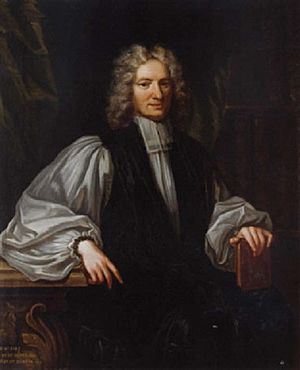William King (bishop) facts for kids
Quick facts for kids The Most Reverend William King D.D. |
|
|---|---|
| Archbishop of Dublin Primate of Ireland |
|
 |
|
| Church | Church of Ireland |
| See | Dublin |
| Appointed | 11 March 1703 |
| In Office | 1703-1729 |
| Predecessor | Narcissus Marsh |
| Successor | John Hoadly |
| Orders | |
| Ordination | 12 April 1674 |
| Consecration | 25 January 1691 by Francis Marsh |
| Personal details | |
| Born | 1 May 1650 Antrim, County Antrim, Kingdom of Ireland |
| Died | 8 May 1729 (aged 79) Dublin, Kingdom of Ireland |
| Buried | St Mary's Church, Donnybrook |
| Nationality | Irish |
| Denomination | Anglican |
| Previous post | Bishop of Derry (1691-1703) |
William King (born May 1, 1650 – died May 8, 1729) was an important church leader in the Church of Ireland. He served as the Archbishop of Dublin from 1703 until his death in 1729. King was also a writer and strongly supported the Glorious Revolution, a major event in British history. He had a lot of power in Ireland, even being able to influence who became judges.
Contents
Early Life and Education
William King was born in May 1650 in County Antrim, which is in Northern Ireland today. His parents had recently moved there from Scotland. He went to school at The Royal School in Dungannon, County Tyrone. After that, he studied at Trinity College Dublin, where he earned his first degree in 1670.
Church Career and Influence
William King began his church career in 1671. He became a deacon, which is the first step to becoming a priest. He worked as a chaplain for John Parker, who was the Archbishop of Tuam. In 1674, King became a priest.
His career advanced quickly because he supported the Glorious Revolution in 1688. This event changed who was king in England and Ireland. In 1691, King became the Bishop of Derry. Then, in 1703, he was promoted to Archbishop of Dublin. He held this important position until he died.
Archbishop King was very generous. In 1718, he gave £1,000 to Trinity College Dublin. This money helped create a special teaching position called "Archbishop King's Professorship of Divinity." Many of his letters still exist today. They are a valuable source for learning about Ireland during his time.
Reforms and Political Power
During his time as a bishop, William King worked to improve the church. He helped build new churches and homes for priests, called glebe houses. He also gave a lot of money to charity, helping those in need. People generally thought he was wise and had good judgment.
King had a lot of political power in Ireland. He was always asked for his opinion on who should be appointed as judges. Sometimes, he could even stop people he thought were not suitable from getting these jobs. However, his influence started to decrease after 1724. This was when Hugh Boulter became the Archbishop of Armagh. Boulter also had a say in judicial appointments, and he and King often disagreed.
King was disappointed that Boulter was chosen for the top church job instead of him. He also strongly opposed "Wood's halfpence" in the 1720s. This was a plan to introduce new copper coins in Ireland, which many people, including King, believed would harm the Irish economy.
After William King died in 1729, Bishop Theophilus Bolton bought about 6,000 of King's books. These books became the start of the Bolton Library in Cashel, County Tipperary.
Writings and Ideas
Besides his church work, William King was also a thoughtful writer and philosopher. He wrote two important books. The first was The State of the Protestants in Ireland under King James's Government, published in 1691.
His second major work was De Origine Mali (which means "On the Origin of Evil"), published in 1702. This book explored difficult questions about why bad things happen in the world if God is good. Another writer, Edmund Law, later translated this book into English.
In De Origine Mali, King discussed the idea of free will. He believed that humans, like God, have a special ability to make choices. This ability, which he called electio, allows people to create good things in the world. Modern thinkers are still studying King's ideas about how our choices lead to value and action.
 | Laphonza Butler |
 | Daisy Bates |
 | Elizabeth Piper Ensley |

